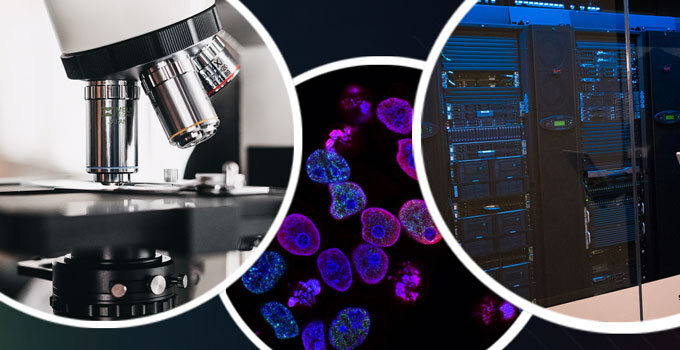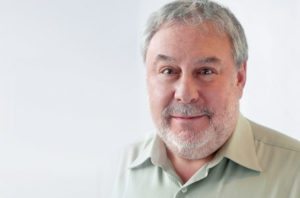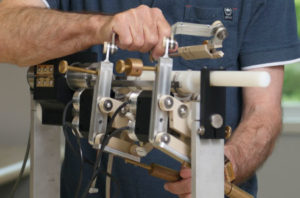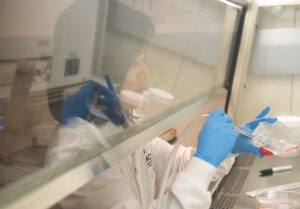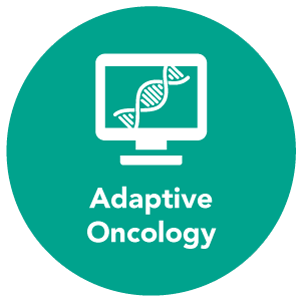OICR-supported researchers are harnessing the power of artificial intelligence to help diagnose cancer quickly and accurately.
The difference between cancerous and non-cancerous tissue can be so subtle it’s almost imperceptible. And yet distinguishing one from the other can mean the difference between life and death.
Early detection is critical to treating cancer effectively, and it’s one of the pillars of OICR’s research strategy. As part of that strategy, the institute is supporting a range of cutting-edge studies that aim to make detecting and diagnosing cancer easier for clinicians by harnessing the power of artificial intelligence (AI).
One of those projects is in colorectal cancer, an especially deadly form of the disease that can be tough to detect. Most colon cancer is diagnosed through a colonoscopy, during which doctors will remove and examine growths in the colon called polyps. Some polyps can be cancerous (known as ‘invasion’) while others just look a lot like cancer (‘pseudo-invasion’). They’re so similar it can take a panel of pathologists several days to be sure if a polyp is cancerous, and that could delay the start of a patient’s treatment.
That’s why OICR-supported researchers at Western University are excited about their AI4Path software, which uses ‘deep learning’ to analyze slides of polyp tissue to determine which ones are cancerous. Deep learning is a type of AI that teaches computers to learn by example, making it ideal for recognizing patterns and classifying different things.
In a recent Scientific Reports paper, researchers showed that AI4Path could differentiate between true and pseudo invasion of polyps with 83.9 per cent accuracy. That’s as accurate as an expert pathologist, and results were delivered in under 13 minutes on average.
AI4Path is the first-ever software designed to classify polyps and researchers believe it could reduce pathologists’ workloads and shorten turnaround times for patients waiting for results.
“Our system can act as a reliable expert pathologist to aid the primary pathologist and provide prompt guidance to managing patient care,” says Dr. Qi Zhang, Assistant Professor of Pathology and Laboratory Medicine at Western University and one of the paper’s lead authors.
Zhang and colleagues are now working on making AI4Path faster and more efficient. They’re also building out other applications to support pathologists and improve screening for colorectal cancer.
Finding skin cancer early is just as important to successfully treating it, and so people are encouraged to go for regular screenings. Many skin cancer screening programs use a device called a dermotoscope, which magnifies and illuminates skin lesions to help see which are cancerous and which are benign.
But the differences between cancerous and skin benign lesions are extremely subtle, especially at the early stages. Even experienced dermatologists can have a hard time distinguishing them.
That’s what drove University of Waterloo Professor Dr. Alexander Wong and colleagues to create Cancer-Net SCa, a deep learning tool that can classify malignant and benign skin lesions.
Their innovative software can deliver quick and accurate results to support dermatologists. In 2022, they reported that Cancer-Net SCa could identify skin cancer with 84 per cent accuracy, and Wong says it has only improved since then.
It’s also efficient, requiring very little computing power or data storage, which Wong and colleagues say makes Cancer-Net SCa easy to integrate into clinical care, and accessible to dermatologists in remote areas in Ontario and around the world.
“We hope [our system can] act as a sort of ‘virtual assistant’,” says Wong, who is also an OICR Affiliate. “Hopefully this gives dermatologists insights that assist them in coming to a well-informed decision.”
AI’s ability to analyze and classify tissues could also help transform breast cancer screening. Mammography is one of the most important tools to find breast cancer early. But mammograms can sometimes miss tumours in women whose dense breast tissue ‘masks’ the appearance of cancerous tissue.
To help close this gap, Sunnybrook Hospital’s Dr. Martin Yaffe has developed an AI algorithm that can analyze images from a mammogram and flag women whose normal dense breast tissue might be masking underlying cancer. These women can then be referred to other tools that are better suited to screen their breasts.
Yaffe, who also co-leads OICR’s Imaging Program, is testing and optimizing his system with the help of an OICR’s Clinical Translation Pathway award. “Our technique uses AI as a tool that can help give women a personalized approach to breast cancer screening and reduce the number of cancers that get missed,” Yaffe says.

